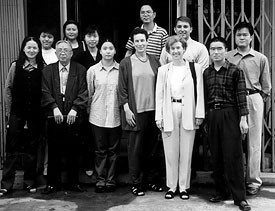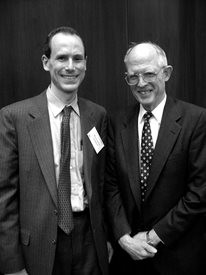Columbia Law School has been bridging the legal communities of China and the U.S. for almost fifty years, bringing in some of the first students from China, helping to establish law clinics in China, and placing graduates in some of the highest levels of the legal profession in China and throughout the world.
In 1980, the arrival of five Chinese scholars at the Columbia Law School was a rare event. While the presence of Chinese scholars was not unprecedented--the Class of 1920 would later count one of China’s most distinguished jurists among them--educational exchanges between the United States and China had nearly ceased during the preceding 30 years. Between Mao’s Great Leap Forward in the late 1950s and the Cultural Revolution waged from 1966-1976, the nation had little need for Western-trained legal experts. Indeed, when Columbia Law School first offered a course on Chinese law taught by Professor Victor Li ’64 (1969-72), the position of law in China had reached a low point for a nation with a legal tradition stretching back thousands of years.

But with U.S.-China diplomatic relations restored in 1979, the Law School revived the tradition of exchange with Chinese academics and practitioners. The arrival of those five Chinese scholars in 1980 as part of PALS (the Program in American Law Scholars developed by Professor R. Randle Edwards) signaled the beginning of the Law School’s effort to reestablish exchange with China, at the time being led by Deng Xiaoping, who was moving quickly to expand ties with the West and begin to reconstruct a legal system.
“As we were becoming aware of the exchange possibilities, the Chinese were themselves taking a greater initiative in international trade and international economic relations, and they needed a body of trained specialists, both academics and officials,” said Professor Edwards, who would lead the Center for Chinese Legal Studies for nearly two decades. He also chaired the Committee for Legal Education Exchange with China (CLEEC) from 1983-1991, a program generally recognized as the most important post-1979 legal education exchange between the United States and China.
Since 1980, China’s legal system has experienced the most rapid development of any country in the history of the world, growing from about 3,000 lawyers in 1978 to some 130,000 trained lawyers by 2005, said Professor Benjamin Liebman, the current director of the Center for Chinese Legal Studies (CCLS). This rapid legal expansion makes it an exciting time to be studying Chinese law at Columbia Law School.

“Despite this rapid change, demand for legal knowledge, and for contact with Western legal scholars, remains immense,” said Professor Liebman.
Since 1980, the Law School has emerged as a leader in the field of Chinese legal studies, the only school among its peers to have had a full-time faculty member specializing in the subject since the early 1970s. Professor Liebman was a high school senior in Newton, Mass., in 1986 when he made his first trip to Beijing as part of an exchange program, the first of its kind in a public school in the United States.
“I went knowing very little about China; I came back knowing that I would be involved with China for the rest of my life,” he said. Professor Liebman spent the following summer making deliveries for a local Chinese food restaurant, "mainly to practice my Chinese,” he admits.
Serving as a bridge to the Chinese legal community, the Center was established by Columbia faculty in 1983 and was led by Professor Edwards until his retirement in 2002. The Center boasts one of the largest concentrations outside of Asia of students and scholars studying the law of China. It serves as the focal point for nearly all of the China-related curricular, extracurricular and exchange activity at the Law School.
“Columbia continues to attract the best American students with an interest in China, and many of the top Chinese students and scholars,” said Professor Liebman. “The level of energy and interest in China here at Columbia is staggering.”
In most years, CCLS hosts around 70 Chinese visiting scholars and students from greater China, with students split evenly between the LL.M. and J.D. programs. The Law School has also hosted Chinese public interest lawyers in many years. The Center also welcomes several visiting scholars to spend the fall and spring semesters in residence conducting research and study. Many of them are supported by the R. Randle Edwards Fellowship, established in honor of the former Walter Gellhorn Professor of Law.
The commitment of Columbia Law School to training Chinese scholars in American law and Americans in Chinese law likely represents the Law School’s greatest impact on the Chinese legal system. As a result of this commitment, Professor Edwards remarked, “I have a feeling that Columbia alumni are playing a leading role in private and public law, and academia, in areas relating to China.” Professor Liebman has ventured beyond the elite law schools and urban hubs during trips to China, in an effort to recruit the outstanding scholars.
Access abounds at the Law School, where visiting scholars are introduced to Columbia faculty and alumni who may share similar research interests, in addition to the wealth of research materials on China collected in the Arthur W. Diamond Law Library.
Other fellowship opportunities administered by the Center include the Haas Fellowship, which provides opportunities for Chinese graduates of the Law School to gain stateside public interest experience before returning to China, and the Oldham Fellowship, which supports J.D. students to go to greater China to do public interest work, government work, or research.
The Center also attracts leading academics, jurists, politicians, human rights activists, judges, and practitioners to its conferences, symposia, and the regularly scheduled lunchtime speaker series, co-sponsored by the student-run Society for Chinese Law. The Center sponsors approximately 20 talks and workshops each year on issues related to Chinese law.
The Law School’s strength lies not only in the activity generated by the Center, but in the dedicated faculty who teach the most expansive range of course offerings on Chinese law of any law school in the country. For example, Professor Madeleine Zelin (an expert in Qing Dynasty law) often teaches a course on Chinese legal history. Professor Liebman teaches a survey course on contemporary Chinese law and legal institutions and in many years leads seminars including one on China and International Law. Typically a large portion of the students enrolled in the advanced research seminars conduct fieldwork in China as part of their coursework; many have had their resulting papers published. With on average at least five percent of matriculating students indicating a strong interest in the law of China, enrollment in all of the courses has soared.
Other Law School faculty members are also an important part of Columbia’s contribution to Chinese legal studies. In most years the Dean and other faculty travel to China for events and for research.
The Center remains focused on its primary goals of engaging CLS students in original research on the Chinese legal system and of establishing the Law School as a leader in the development of public interest law in China. Indeed, as hundreds of Law School alumni return to jobs in Taipei, Shanghai, Beijing, and cities around the world, Columbia’s far-reaching impact on China and the region is worth watching.
The information on this page was adapted from an article written by Rebecca Thomas, Assistant Editor.
